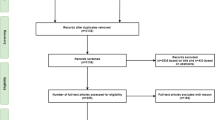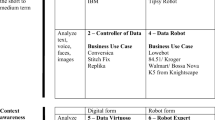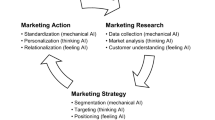Abstract
The present study introduces a conceptual framework to explore sales professionals’ use of artificial intelligence (AI) in the sales process. The author explores AI’s impact and its relationships with specific outcomes within the sales process. The study first explores the embryonic artificial intelligence literature on sales to measure sales professionals’ perceptions of AI by conducting a content analysis. Based on the results, 79 studies were found on AI and sales, with only 13 specifically looking at the business-to-business sales process. Given the newness of AI, this is a dire need to dive deeper into the use of AI in the B2B sales process. A content analysis from the scant literature and data from 62 sales professionals was performed to conceptually develop a framework proposing AI’s impact on several outcomes: sales process effectiveness, administrative efficiency, and performance with customers.


Similar content being viewed by others
Data availability
Not available.
References
Ahearne, M., D.E. Hughes, and N. Schillewaert. 2007. Why sales reps should welcome information technology: Measuring the impact of CRM-based IT on sales effectiveness. International Journal of Research in Marketing 24 (4): 336–349.
Ahearne, M., E. Jones, A. Rapp, and J. Mathieu. 2008. High touch through high tech: The impact of salesperson technology usage on sales performance via mediating mechanisms. Management Science 54 (4): 671–685.
Alabi, Toloupe. 2023. The power of AI in sales and 5 ways to use it. https://blog.hubspot.com/sales/ai-in-sales. Accessed 11 Dec 2023.
Alavi, S., and J. Habel. 2021. The human side of digital transformation in sales: Review and future paths. Journal of Personal Selling and Sales Management 41 (2): 83–86.
Bharadwaj, Neeraj, Michel Ballings, Prasad A. Naik, Miller Moore, and Mustafa Arat. 2022. A new livestream retail analytics framework to assess the sales impact of emotional displays. Journal of Marketing 86 (1): 27–47.
Campbell, C., S. Sands, C. Ferraro, H.Y.J. Tsao, and A. Mavrommatis. 2020. From data to action: How marketers can leverage AI. Business Horizons 63 (2): 227–243.
Chen, J., and W. Zhou. 2022. Drivers of salespeople’s AI acceptance: What do managers think? Journal of Personal Selling and Sales Management 42 (2): 107–120.
Cotter, G., M. Guan, M. Mahdavian, S. Razzaq, and J.D. Schneider. 2018. What the future science of B2B sales growth looks like. New York: McKinsey and Company.
Daviet, Remi, Gideon Nave, and Jerry Wind. 2022. Genetic data: Potential uses and misuses in marketing. Journal of Marketing 86 (1): 7–26.
Davis, F.D. 1989. Technology acceptance model: TAM. In Information seeking behavior and technology adoption, ed. M.N. Al-Suqri and A.S. Al-Aufi, 205–219. Hershey: IGI Global.
Dickie, Jim, Boris Groysberg, Benson P. Shapiro, and Barry Trailer. 2022. Can AI really help you sell? Harvard Business Review (Nov–Dec).
Erffmeyer, R.C., and D.A. Johnson. 2001. An exploratory study of sales force automation practices: Expectations and realities. Journal of Personal Selling and Sales Management 21 (2): 167–175.
Gartner for Sales. 2022. The future of sales. Gartner for Sales. https://emtemp.gcom.cloud/ngw/globalassets/en/sales-service/documents/trends/future_of_sales_ebook.pdf.
Graneheim, U.H., and B. Lundman. 2004. Qualitative content analysis in nursing research: Concepts, procedures, and measures to achieve trustworthiness. Nurse Education Today 24: 105–112.
Gray, J.H., and I.L. Densten. 1998. Integrating quantitative and qualitative analysis using latent and manifest variables. Quality and Quantity 32 (4): 419–431.
Gwin, J.M., and W.D. Perreault Jr. 1981. Industrial sales call planning. Industrial Marketing Management 10 (3): 225–234.
Haenlein, M., and A. Kaplan. 2019. A brief history of artificial intelligence: On the past, present, and future of artificial intelligence. California Management Review 61 (4): 5–14.
Hall, K.R., D.E. Harrison, H. Ajjan, and G.W. Marshall. 2022. Understanding salesperson intention to use AI feedback and its influence on business-to-business sales outcomes. Journal of Business and Industrial Marketing 37 (9): 1787–1801.
Hoffman, D.L., C.P. Moreau, S. Stremersch, and M. Wedel. 2022. The rise of new technologies in marketing: A framework and outlook. Journal of Marketing 86 (1): 1–6.
Hunter, G.K., and W.D. Perreault Jr. 2007. Making sales technology effective. Journal of Marketing 71 (1): 16–34.
IBM Institute of Business Value. 2023. Turning data into value. IBM Institute of Business Value. https://www.ibm.com/thought-leadership/institute-business-value/en-us/report/cdo-2023.
IDC Report. 2022. Worldwide B2B sales leadership 2023 predictions. IDC. https://www.idc.com/getdoc.jsp?containerId=US49724422.
Kejriwal, Mayank. 2022. Augmented artificial intelligence. In Artificial intelligence for industries of the future: Beyond Facebook, Amazon, Microsoft, and Google, 75–100. Cham: Springer.
Longoni, Chiara, and Luca Cian. 2022. Artificial intelligence in utilitarian versus hedonic contexts: The ‘Word-of-Machine’ effect. Journal of Marketing 86 (1): 91–108.
Luo, X., M.S. Qin, Z. Fang, and Z. Qu. 2021. Artificial intelligence coaches for sales agents: Caveats and solutions. Journal of Marketing 85 (2): 14–32.
Manis, K.T., and S. Madhavaram. 2023. AI-enabled marketing capabilities and the hierarchy of capabilities: Conceptualization, proposition development, and research avenues. Journal of Business Research 157 (March): 1–20.
Marshall, G.W., W.C. Moncrief, J.M. Rudd, and N. Lee. 2012. Revolution in sales: The impact of social media and related technology on the selling environment. Journal of Personal Selling and Sales Management 32 (3): 349–363.
Paschen, J., J. Kietzmann, and T. Kietzmann. 2019. Artificial intelligence (AI) and its implications for market knowledge in B2B marketing. Journal of Business and Industrial Marketing 34 (7): 1410–1419.
Paschen, J., M. Wilson, and J.J. Ferreira. 2020. Collaborative intelligence: How human and artificial intelligence create value along the B2B sales funnel. Business Horizons 63 (3): 403–414.
Paschen, J., U. Paschen, E. Pala, and J. Kietzmann. 2021. Artificial intelligence (AI) and value co-creation in B2B sales: Activities, actors, and resources. Australasian Marketing Journal 29 (3): 243–251.
Petrescu, M., and A.S. Krishen. 2018. Analyzing the analytics: Data privacy concerns. Journal of Marketing Analytics 6 (2): 41–43.
Petrescu, M., A.S. Krishen, S. Kachen, and J.T. Gironda. 2022. AI-based innovation in B2B marketing: An interdisciplinary framework incorporating academic and practitioner perspectives. Industrial Marketing Management 103 (2): 61–72.
Richey, R.G., Jr., M. Tokman, and L.R. Skinner. 2008. Exploring collaborative technology utilization in retailer–supplier performance. Journal of Business Research 61 (8): 842–849.
Rodriguez, M., and S. Boyer. 2020. The impact of mobile customer relationship management (mCRM) on sales collaboration and sales performance. Journal of Marketing Analytics 8: 137–148.
Rodriguez, M., and E.D. Honeycutt Jr. 2011. Customer relationship management (CRM)’s impact on B-to-B sales professionals’ collaboration and sales performance. Journal of Business-to-Business Marketing 18 (4): 335–356.
Rogers, E.M. 2010. Diffusion of innovations. New York: Simon and Schuster.
Schiessl, D., H.B.A. Dias, and J.C. Korelo. 2022. Artificial intelligence in marketing: A network analysis and future agenda. Journal of Marketing Analytics 10 (3): 207–218.
Segars, A.H. 1997. Assessing the unidimensionality of measurement: A paradigm and illustration within the context of information systems research. Omega 25 (1): 107–121.
Shoemaker, P.J., and S.D. Reese. 1996. Mediating the message. White Plains: Longman.
Singh, J., K. Flaherty, R.S. Sohi, D. Deeter-Schmelz, J. Habel, K. Le Meunier-FitzHugh, and V. Onyemah. 2019. Sales profession and professionals in the age of digitization and artificial intelligence technologies: Concepts, priorities, and questions. Journal of Personal Selling and Sales Management 39 (1): 2–22.
Stoddard, J.E., S.W. Clopton, and R.A. Avila. 2006. An analysis of the effects of sales force automation on salesperson perceptions of performance. Journal of Selling and Major Account Management 6 (1): 38–56.
Sujan, Harish, B. Weitz, and Mita Sujan. 2013. Increasing sales productivity by getting salespeople to work smarter. Journal of Personal Selling and Sales Management 8 (2): 9–19.
Syam, N., and A. Sharma. 2018. Waiting for a sales renaissance in the Fourth Industrial Revolution: Machine learning and artificial intelligence in sales research and practice. Industrial Marketing Management 69: 135–146.
Tan, Yong-Chin., Sandeep R. Chandukala, and Srinivas K. Reddy. 2022. Augmented reality in retail and its impact on sales. Journal of Marketing 86 (1): 48–66.
Venkatesh, V., and F.D. Davis. 2000. A theoretical extension of the technology acceptance model: Four longitudinal field studies. Management Science 46 (2): 186–204.
Wedel, M., and P.K. Kannan. 2016. Marketing analytics for data-rich environments. Journal of Marketing 80 (6): 97–121.
Author information
Authors and Affiliations
Corresponding author
Additional information
Publisher's Note
Springer Nature remains neutral with regard to jurisdictional claims in published maps and institutional affiliations.
Rights and permissions
Springer Nature or its licensor (e.g. a society or other partner) holds exclusive rights to this article under a publishing agreement with the author(s) or other rightsholder(s); author self-archiving of the accepted manuscript version of this article is solely governed by the terms of such publishing agreement and applicable law.
About this article
Cite this article
Rodriguez, M., Peterson, R. Artificial intelligence in business-to-business (B2B) sales process: a conceptual framework. J Market Anal (2024). https://doi.org/10.1057/s41270-023-00287-7
Revised:
Accepted:
Published:
DOI: https://doi.org/10.1057/s41270-023-00287-7




